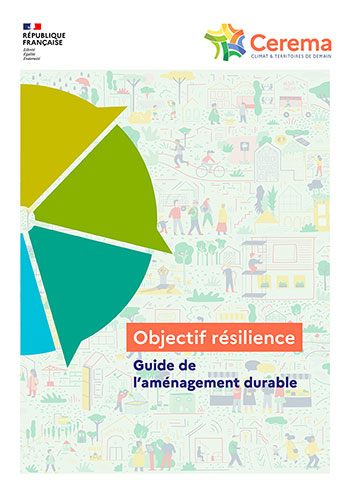This article is part of the folder : Dossier : Les Contrats de Relance et de Transition Ecologique
See the 15 news related to this folder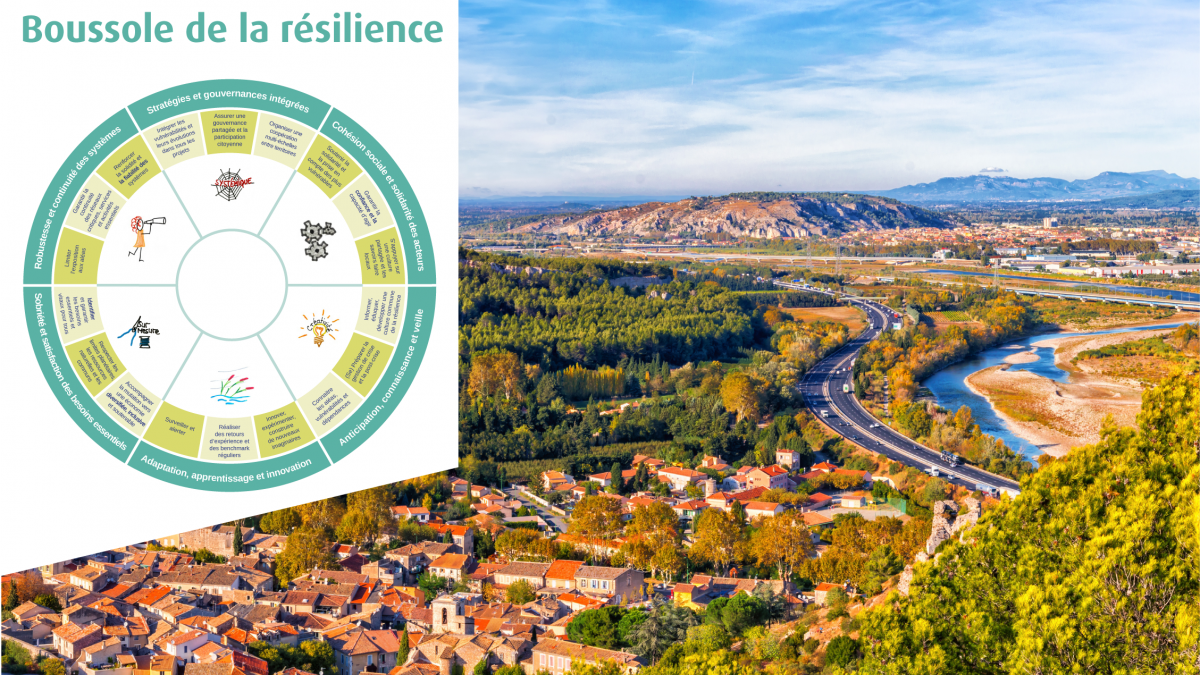
How can local authorities, as well as organisations, plan, adapt, and transform so that they are better equipped to manage sudden disruptions, like the pandemic which has just rocked the world, or longer term developments like climate change and the collapse of biodiversity? Cerema’s comprehensive, transversal approach to adaptation offers answers to these questions, and proposals for actions to explore.
Our regions are confronted with a range of hazards which, depending on their scale, may engender a crisis. Their impact is all the greater when it is impossible to predict them and plan a response.
Climate change, for example, exposes regions to a greater number of risks and natural disasters, which are now more frequent and more intense. Regional adaptation is only possible by implementing true regional strategies as part of a resilient approach to planning.
Faced with these more frequent global crises, our regions are adapting

Humanity has now entered the Anthropocene era, one marked by disruption to the planet’s natural balance – climate change, collapsing biodiversity – that can cause systemic crises.
The Covid-19 pandemic has shown that the form these crises take, as well as their causes, can be extremely varied, and their effects ever more systemic, affecting healthcare, the economy, and lifestyles, with a greater impact on human communities, especially the most fragile. Situated on the front-line, regional authorities are discovering just how vulnerable they are. But they are also discovering their capacity to cope, to adapt and transform, in the hope of being better prepared for future crises.
In an effort to help regions develop and implement long-term adaptation strategies, Cerema has designed a handbook to serve as a guide for stakeholders.
A number of tools are available to local authorities in dealing with these challenges, tools that are also local in nature, and encompass water and energy management, preservation of soils and the natural environment, and the development of the circular economy…
These tools also present an opportunity to enter into dialogue with different regional stakeholders (elected political representatives, economic actors, NGOs, and the community…) in order to develop solutions tailored to reality on the ground, and both present and future hazards.
The watchword underpinning these strategies is forward planning, to reduce vulnerability by implementing actions that cover every aspect of regional life. To get there, we need to change our point of view, and this is exactly what Cerema’s innovative tool sets out to do: a compass to guide forward planning initiatives.
A compass to stay on a jointly determined course
Cerema’s “resilience compass” is a tool designed to support local authorities, who are constantly assessing the challenges they face. Designed as a framework for action, the compass is structured around 6 mechanisms, broken down further into 18 principles for action, to enhance the ability of our regions to prepare for a crisis, to respond and adapt to disruption, and to bounce back.
In addition to these “traditional” mechanisms that cover both regional adaptation and risk management, the compass affirms the importance of transformation as the key principle in an approach that must be inherently global and transversal.
The resilience compass, designed to be easy for users to appropriate, is intended to provide avenues for local authorities (or any other organisation) to explore, by identifying their level of maturity in the matter.
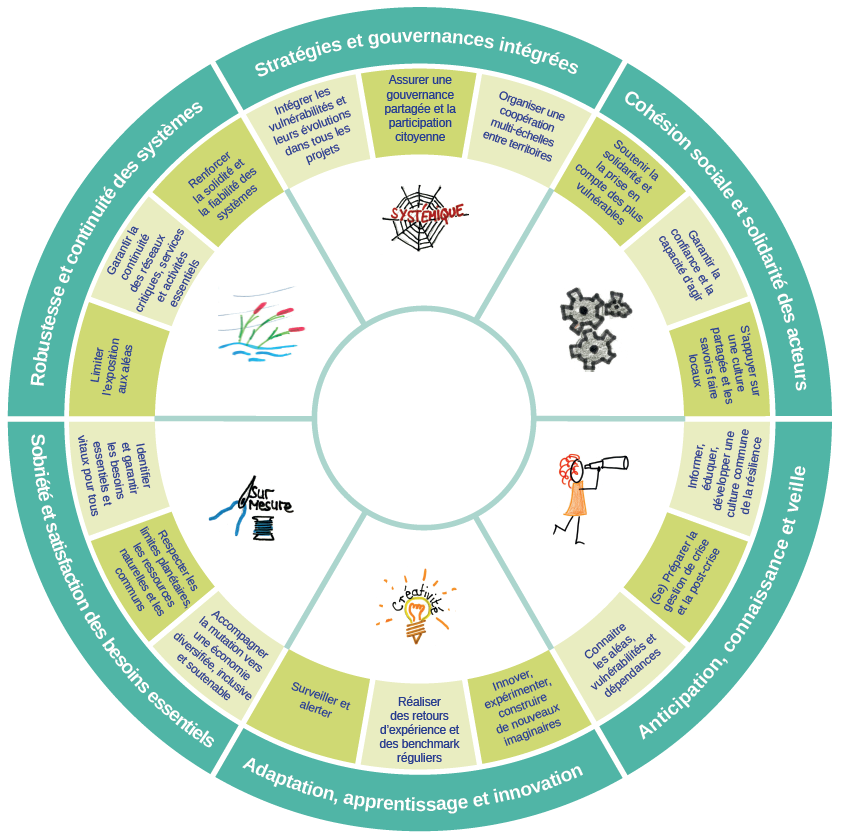
Applied to existing actions and projects, it examines them through the lens of adaptation. It can reveal shortcomings, to supplement them and bolster their contribution to the region’s overall resilience.
The 18 principles for action are illustrated through concrete case studies that make it easier to operationally apply the concepts in question. The compass can be applied to any kind of project or public policy. Each local authority that uses the compass can use and enrich it in their own way, making it more robust. Cerema has built the principle of capitalising on experience and evolution into the compass.
A "quick guide" providing a detailed presentation of the compass and how it is used will be published in the autumn, and will provide more information about each mechanism and possible actions.
utiliser la boussole
La "boussole de la résilience" du Cerema est un cadre de coopération et d'action qui s'utilise à différentes étapes d'une démarche pour :
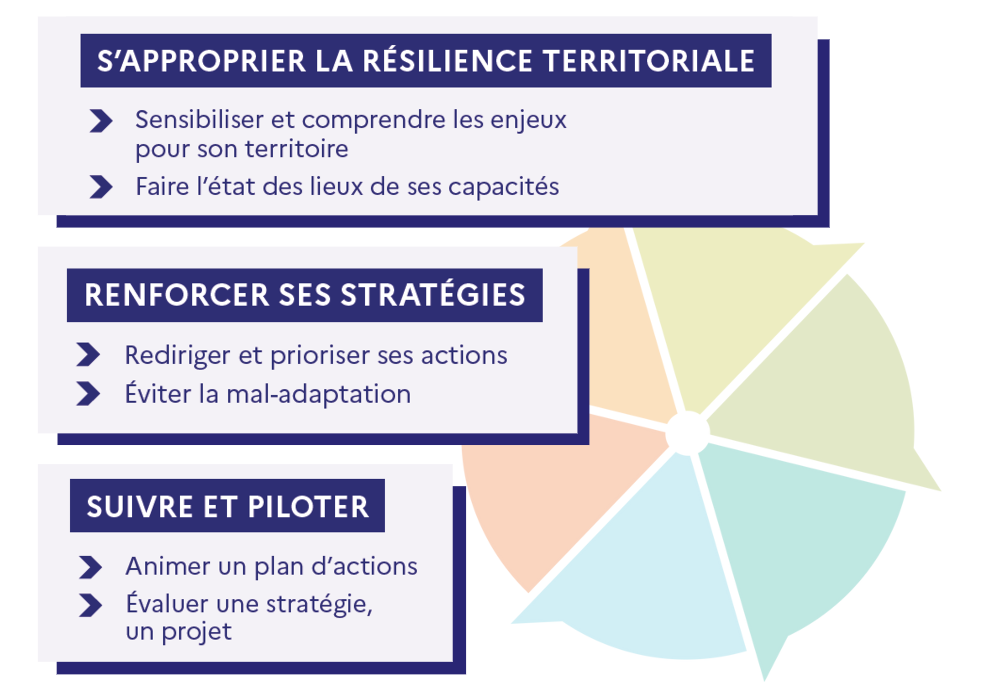
Elle peut ainsi être mobilisée pour comprendre les forces et vulnérabilités de son territoire, pour renforcer son plan d'action et sa stratégie en évitant la mal-adaptation, ou comme une grille de lecture et de cohérence pour prioriser ses actions.
Se poser les bonnes questions :
Un atelier autour de la boussole de la résilience à Mens-en-Trièves
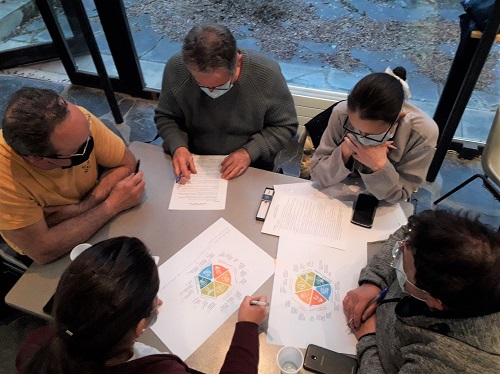 La commune de Mens est déjà très engagée et impliquée dans la transition écologique et solidaire. Forte d’un terreau associatif très mobilisé et actif, elle met en place depuis de nombreuses années des actions et des projets alliant sobriété énergétique, prise en compte de l’environnement et inclusion sociale, avec par exemple un projet de logements durables partagés et inclusifs et la végétalisation et désimperméabilisation de la place de la Mairie.
La commune de Mens est déjà très engagée et impliquée dans la transition écologique et solidaire. Forte d’un terreau associatif très mobilisé et actif, elle met en place depuis de nombreuses années des actions et des projets alliant sobriété énergétique, prise en compte de l’environnement et inclusion sociale, avec par exemple un projet de logements durables partagés et inclusifs et la végétalisation et désimperméabilisation de la place de la Mairie.
Vis-à-vis de la résilience, l’équipe municipale en place a déjà eu l’occasion de vivre une Fresque du Climat, qui lui a permis de renforcer sa prise de conscience de l’urgence à agir.
L’inscription de la ville de Mens dans le programme Petites Villes de Demain est l’occasion d’élargir son approche des aléas pouvant impacter le territoire et d’anticiper pour améliorer la résilience de la ville. La municipalité a sollicité le Cerema pour l’accompagner dans cette démarche.
Début mars 2022, le Cerema a organisé et animé un atelier réunissant une vingtaine d’élus et de techniciens de la Ville de Mens, de la communauté de communes du Trièves et de la région Auvergne-Rhône-Alpes, pour aborder la résilience à Mens-en-Trièves.
Les participants ont été invités à réfléchir aux aléas pouvant impacter leur territoire, en s’appuyant sur des notions en lien avec la résilience. Le partage de ces réflexions individuelles, enrichi d’apports théoriques, a permis au collectif de construire une vision partagée des menaces pouvant perturber le fonctionnement et l’équilibre actuel de la ville de Mens et d’esquisser une vision des enjeux vis-à-vis de ces aléas.
Sur la base d’une présentation des principes de résilience et de la boussole de la résilience, les participants à l’atelier, répartis en plusieurs groupes, ont ensuite sélectionné quelques-uns des projets en cours ou envisagés par la commune, pour les passer au crible de la boussole. Cela a donné lieu à de riches échanges, à des questionnements sur les choix possibles vis-à-vis de ces projets et à l’émergence de solutions pour développer les leviers de résilience du territoire.
Résultat notable : face au libre choix des projets à examiner au regard de la résilience, le sujet des fêtes traditionnelles et des manifestations culturelles a été sélectionné par chacun des groupes, révélant combien l’enjeu de partage, de rencontres et de temps collectifs et festifs, en un mot de lien social, est fort et facteur de résilience.
A comprehensive adaptation service
Cerema’s resilience compass is just one part of a more comprehensive range of services for regional adaptation. Cerema supports regions in their adaptation and resilience strategies, through awareness-raising sessions or bespoke in-house training in developing an adaptation strategy.
Cerema also offers support in developing a prospective diagnostic covering the next 20-30 years, integrating the principles of resilience into existing projects and strategies, and formulating strategies to transition towards regions that are cleaner, more resilient, and more inclusive.
Cerema contact
In the folder : Dossier : Les Contrats de Relance et de Transition Ecologique


